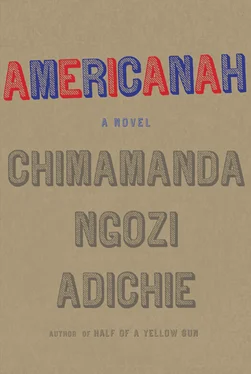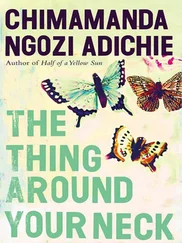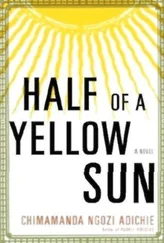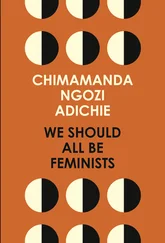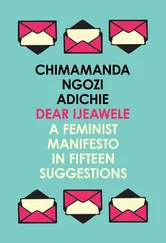“I’m chasing you.”
She would always remember this moment, those words. I’m chasing you .
“I saw you in school some time ago. I even asked Kay about you,” he said.
“Are you serious?”
“I saw you holding a James Hadley Chase, near the lab. And I said, Ah, correct, there is hope. She reads.”
“I think I’ve read them all.”
“Me too. What’s your favorite?”
“ Miss Shumway Waves a Wand .”
“Mine is Want to Stay Alive? I stayed up one night to finish it.”
“Yes, I like that too.”
“What about other books? Which of the classics do you like?”
“Classics, kwa? I just like crime and thrillers. Sheldon, Ludlum, Archer.”
“But you also have to read proper books.”
She looked at him, amused by his earnestness. “Aje-butter! University boy! That must be what your professor mother taught you.”
“No, seriously.” He paused. “I’ll give you some to try. I love the American ones.”
“You have to read proper books,” she mimicked.
“What about poetry?”
“What’s that last one we did in class, ‘Ancient Mariner’? So boring.”
Obinze laughed, and Ifemelu, uninterested in pursuing the subject of poetry, asked, “So what did Kayode say about me?”
“Nothing bad. He likes you.”
“You don’t want to tell me what he said.”
“He said, ‘Ifemelu is a fine babe but she is too much trouble. She can argue. She can talk. She never agrees. But Ginika is just a sweet girl.’ ” He paused, then added, “He didn’t know that was exactly what I hoped to hear. I’m not interested in girls that are too nice.”
“Ahn-ahn! Are you insulting me?” She nudged him, in mock anger. She had always liked this image of herself as too much trouble, as different, and she sometimes thought of it as a carapace that kept her safe.
“You know I’m not insulting you.” He put an arm around her shoulders and pulled her to him gently; it was the first time their bodies had met and she felt herself stiffen. “I thought you were so fine, but not just that. You looked like the kind of person who will do something because you want to, and not because everyone else is doing it.”
She rested her head against his and felt, for the first time, what she would often feel with him: a self-affection. He made her like herself. With him, she was at ease; her skin felt as though it was her right size. She told him how she very much wanted God to exist but feared He did not, how she worried that she should know what she wanted to do with her life but did not even know what she wanted to study at university. It seemed so natural, to talk to him about odd things. She had never done that before. The trust, so sudden and yet so complete, and the intimacy, frightened her. They had known nothing of each other only hours ago, and yet, there had been a knowledge shared between them in those moments before they danced, and now she could think only of all the things she yet wanted to tell him, wanted to do with him. The similarities in their lives became good omens: that they were both only children, their birthdays two days apart, and their hometowns in Anambra State. He was from Abba and she was from Umunnachi and the towns were minutes away from each other.
“Ahn-ahn! One of my uncles goes to your village all the time!” he told her. “I’ve been a few times with him. You people have terrible roads.”
“I know Abba. The roads are worse.”
“How often do you go to your village?”
“Every Christmas.”
“Just once a year! I go very often with my mother, at least five times a year.”
“But I bet I speak Igbo better than you.”
“Impossible,” he said, and switched to Igbo. “ Ama m atu inu . I even know proverbs.”
“Yes. The basic one everybody knows. A frog does not run in the afternoon for nothing.”
“No. I know serious proverbs. Akota ife ka ubi, e lee oba . If something bigger than the farm is dug up, the barn is sold.”
“Ah, you want to try me?” she asked, laughing. “ Acho afu adi ako n’akpa dibia . The medicine man’s bag has all kinds of things.”
“Not bad,” he said. “ E gbuo dike n’ogu uno, e luo na ogu agu, e lote ya . If you kill a warrior in a local fight, you’ll remember him when fighting enemies.”
They traded proverbs. She could say only two more before she gave up, with him still raring to go.
“How do you know all that?” she asked, impressed. “Many guys won’t even speak Igbo, not to mention knowing proverbs.”
“I just listen when my uncles talk. I think my dad would have liked that.”
They were silent. Cigarette smoke wafted up from the entrance of the guesthouse, where some boys had gathered. Party noises hung in the air: loud music, the raised voices and high laughter of boys and girls, all of them looser and freer than they would be the next day.
“Aren’t we going to kiss?” she asked.
He seemed startled. “Where did that come from?”
“I’m just asking. We’ve been sitting here for so long.”
“I don’t want you to think that is all I want.”
“What about what I want?”
“What do you want?”
“What do you think I want?”
“My jacket?”
She laughed. “Yes, your famous jacket.”
“You make me shy,” he said.
“Are you serious? Because you make me shy.”
“I don’t believe anything makes you shy,” he said.
They kissed, pressed their foreheads together, held hands. His kiss was enjoyable, almost heady; it was nothing like her ex-boyfriend Mofe, whose kisses she had thought too salivary.
When she told Obinze this some weeks later — she said, “So where did you learn to kiss? Because it’s nothing like my ex-boyfriend’s salivary fumbling”—he laughed and repeated “salivary fumbling!” and then told her that it was not technique, but emotion. He had done what her ex-boyfriend had done but the difference, in this case, was love.
“You know it was love at first sight for both of us,” he said.
“For both of us? Is it by force? Why are you speaking for me?”
“I’m just stating a fact. Stop struggling.”
They were sitting side by side on a desk in the back of his almost empty classroom. The end-of-break bell began to ring, jangling and discordant.
“Yes, it’s a fact,” she said.
“What?”
“I love you.” How easily the words came out, how loudly. She wanted him to hear and she wanted the boy sitting in front, bespectacled and studious, to hear and she wanted the girls gathered in the corridor outside to hear.
“Fact,” Obinze said, with a grin.
Because of her, he had joined the debate club, and after she spoke, he clapped the loudest and longest, until her friends said, “Obinze, please, it is enough.” Because of him, she joined the sports club and watched him play football, sitting by the sidelines and holding his bottle of water. But it was table tennis that he loved, sweating and shouting as he played, glistening with energy, smashing the small white ball, and she marveled at his skill, how he seemed to stand too far away from the table and yet managed to get the ball. He was already the undefeated school champion, as he had been, he told her, in his former school. When she played with him, he would laugh and say, “You don’t win by hitting the ball with anger o!” Because of her, his friends called him “woman wrapper.” Once, as he and his friends talked about meeting after school to play football, one of them asked, “Has Ifemelu given you permission to come?” And Obinze swiftly replied, “Yes, but she said I have only an hour.” She liked that he wore their relationship so boldly, like a brightly colored shirt. Sometimes she worried that she was too happy. She would sink into moodiness, and snap at Obinze, or be distant. And her joy would become a restless thing, flapping its wings inside her, as though looking for an opening to fly away.
Читать дальше
